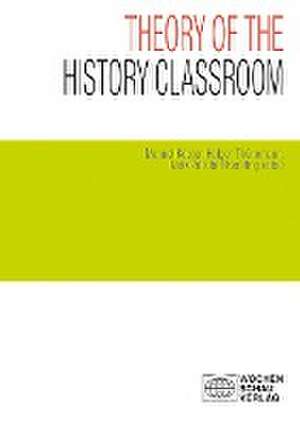Theory of the History Classroom: Geschichtsunterricht erforschen
Editat de Manuel Köster, Holger Thünemann, Meik Zülsdorf-Kerstingen Limba Engleză Paperback – 28 feb 2022
Din seria Geschichtsunterricht erforschen
-
 Preț: 123.93 lei
Preț: 123.93 lei -
 Preț: 191.71 lei
Preț: 191.71 lei -
 Preț: 205.42 lei
Preț: 205.42 lei - 11%
 Preț: 412.50 lei
Preț: 412.50 lei -
 Preț: 296.12 lei
Preț: 296.12 lei -
 Preț: 345.93 lei
Preț: 345.93 lei -
 Preț: 246.44 lei
Preț: 246.44 lei -
 Preț: 188.06 lei
Preț: 188.06 lei
Preț: 192.35 lei
Nou
Puncte Express: 289
Preț estimativ în valută:
36.81€ • 40.11$ • 31.01£
36.81€ • 40.11$ • 31.01£
Carte disponibilă
Livrare economică 29 martie-04 aprilie
Livrare express 19-25 martie pentru 26.66 lei
Preluare comenzi: 021 569.72.76
Specificații
ISBN-13: 9783734413841
ISBN-10: 3734413842
Pagini: 240
Dimensiuni: 206 x 144 x 15 mm
Greutate: 0.32 kg
Editura: Wochenschau Verlag
Seria Geschichtsunterricht erforschen
ISBN-10: 3734413842
Pagini: 240
Dimensiuni: 206 x 144 x 15 mm
Greutate: 0.32 kg
Editura: Wochenschau Verlag
Seria Geschichtsunterricht erforschen
Cuprins
Manuel Köster, Holger Thünemann and Meik Zülsdorf-Kersting Foreword to the English edition Manuel Köster, Holger Thünemann 1. Introduction to the German edition Meik Zülsdorf-Kersting 2. The history classroom as a social system 2.1 Introduction 2.2 Theory of classroom education ¿ remarks from a theory of science perspective 2.3 Classroom education as a social system 2.3.1 Models of classroom education 2.3.2 Modelling utilisation of learning opportunities 2.3.3 Systems theory and the history classroom 2.3.4 Contingency and the history classroom 2.3.5 Emergence and the history classroom 2.3.6 Pedagogicity and communication 2.3.7 The system and the environment of the history classroom 2.3.8 Genesis of the form of the history classroom 2.4 History didactics and theories of history in the classroom ¿ an overview 2.5 Between contingency and contingency constraints ¿ a systems theory view of history in the classroom 2.5.1 The concept of the history classroom 2.5.2 Structural model of the history classroom 2.5.2.1 Historical thinking 2.5.2.2 Emotions in the history classroom 2.5.2.3 Communication in the history classroom 2.5.2.4 Media in the history classroom 2.5.2.5 Language in the history classroom Holger Thünemann and Johannes Jansen 3. Learning to think historically 3.1 Introduction 3.2 Traditions in history didactics and models of historical thinking 3.2.1 English-speaking countries ¿ concepts of historical thinking 3.2.2 German-speaking countries ¿ historical consciousness in history didactics 3.2.2.1 Historical consciousness and historical thinking I: Jeismann 3.2.2.2 Historical consciousness and historical thinking II: Rüsen 3.2.2.3 Historical consciousness and historical thinking III: Hasberg and Körber 3.2.2.4 Historical consciousness and historical thinking IV: Competency models of historical thinking 3.3 The HISTOGRAPH model of historical thinking ¿ towards synthesis 3.3.1 Historical queries 3.3.2 Historical case analyses 3.3.3 Historical causal judgements 3.3.4 Historical value judgements 3.3.5 Historical thinking and historical knowledge 3.3.6 Historical thinking, historical learning and acquiring historical competency Sebastian Brack and Colin Flaving 4. Emotions in the history classroom 4.1 Introduction 4.2 Emotions in history didactics 4.3 Theory of emotions 4.3.1 Genesis of emotions 4.3.2 Components, functions and effects of emotions 4.3.3 Controlling emotions 4.4 Emotions and historical learning 4.4.1 Emotions and learning 4.4.2 Emotions and historical thinking 4.5 Emotions in the social system of the history classroom 4.6 The history classroom and theory of emotions Christoph Wilfert and Simone Lankes 5. Communication 5.1 Introduction 5.2 Historical thinking and communication 5.3 Learning reflexive historical thinking by communicating 5.4 The classroom as a communicative space 5.4.1 Communication-based roles in the classroom 5.4.2 Core structure of classroom communication: IRE sequences 5.4.3 Organising turn-taking 5.5 Negotiating history in classroom communication Jennifer Lahmer-Gebauer 6. Media in the history classroom 6.1 Introduction 6.2 Sources and accounts as distribution media in the social system of the history classroom 6.2.1 Importance of sources and accounts for learning history in the classroom 6.2.2 Dealing with sources and accounts in the history classroom marked by subject-specific pedagogicity 6.2.3 Consequences for communication in the social system of the history classroom 6.3 A systems theory perspective on media in the history classroom 6.3.1 Meaning: the universal medium 6.3.2 Communication media 6.3.2.1 Language 6.3.2.2 Symbolically generalised communication media 6.4 Conclusion Manuel Köster and Christian Spieß 7. Language 7.1 Language in the social system of the history classroom 7.2 Dimension 1: registers 7.2.1 Casual register 7.2.2 Academic and technical register 7.2.3 Pedagogical register 7.3 Dimension 2: languages of the history classroom 7.3.1 The languages of history as a subject 7.3.1.1 The language of the sources 7.3.1.2 The language of historical accounts 7.3.2 The languages of classroom discourse 7.3.2.1 Student language 7.3.2.2 Teachers¿ language 7.4 Conclusion Manuel Köster and Meik Zülsdorf-Kersting 8. Conclusion: Potentials for a contingency-conscious theory of history in the classroom References Table of figures List of contributors Register
